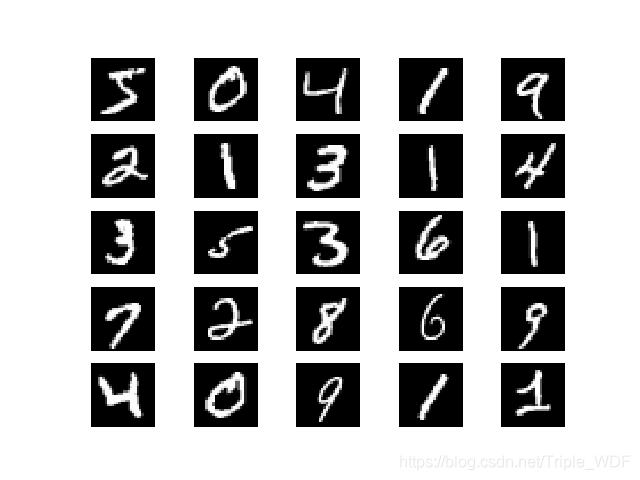本部分介绍三款标准图像识别数据集,分别为MNIST、Fashion-MNIST、SmallNORB。
目录
一、MNIST
链接:https://pan.baidu.com/s/1onS1F4jWgtbUURymJXFtAg
提取码:5lfn

二、Fashion-MNIST
链接:https://pan.baidu.com/s/1NFqZ1SJ__EZJ8boWbx_Mng
提取码:je02

三、SmallNORB
链接:https://pan.baidu.com/s/1VapMXBTZwRP1vcCsznN7Lg
提取码:ziek

四、解析代码
code1~code3用于提取三款数据集数据,code4将三种数据集进行集中操作。最后地数据集形式转化为,[图像样本个数,单一图像拉伸为一维向量长度],例如:MNIST解析之后为[60000, 784]。
code1:py for MNIST
# import cPickle
import pickle
import gzip
import numpy as np
def load_data():
f = gzip.open('D:\dataset\mnist.pkl.gz', 'rb')
training_data, validation_data, test_data = pickle.load(f, encoding='bytes')
# print (training_data)
# print (validation_data)
# print (test_data)
f.close()
return (training_data, validation_data, test_data)
def vectorized_result(j):
e = np.zeros((10, 1))
e[j] = 1.0
return e
def load_data_wrapper():
tr_d, va_d, te_d = load_data()
#training_data
training_inputs = [np.reshape(x, (784, 1)) for x in tr_d[0]]
training_results = [vectorized_result(y) for y in tr_d[1]]
training_data = zip(training_inputs, training_results)
#validation_data
validation_inputs = [np.reshape(x, (784, 1)) for x in va_d[0]]
validation_results = [vectorized_result(y) for y in va_d[1]]
validation_data = zip(validation_inputs, validation_results)
#test_data
test_inputs = [np.reshape(x, (784, 1)) for x in te_d[0]]
test_data = zip(test_inputs, te_d[1])
return (training_data, validation_data, test_data)
code2:py for Fashion-MNIST
import os
import gzip
import numpy as np
# import matplotlib.pyplot as plt
'''
0:T-shirt/top
1:Trouser
2:Pullover
3:Dress
4:Coat
5:Sandal
6:Shirt
7:Sneaker
8:Bag
9:Ankle boot
'''
def vectorized_result(j):
e = np.zeros((10, 1))
e[j] = 1.0
return e
def load_mnist(path, kind='train'):
labels_path = os.path.join(path,'%s-labels-idx1-ubyte.gz' % kind)
images_path = os.path.join(path,'%s-images-idx3-ubyte.gz' % kind)
with gzip.open(labels_path, 'rb') as lbpath:
labels = np.frombuffer(lbpath.read(), dtype=np.uint8,offset=8)
with gzip.open(images_path, 'rb') as imgpath:
images = np.frombuffer(imgpath.read(), dtype=np.uint8,offset=16).reshape(len(labels), 784)
return images, labels
def fashionmnist_loader():
x_train, y_train = load_mnist('D:\dataset\\fashionMnist')
x_test, y_test = load_mnist('D:\dataset\\fashionMnist', 't10k')
y_tr = np.zeros((len(x_train), 10))
for i in range(len(x_train)):
y_tr[i][int(y_train[i])] = 1.0
return x_train/255.0, y_tr, x_test/255.0, y_test
code3:py for SmallNORB
import numpy as np
import pickle
# from sklearn.decomposition import PCA
def smallnorb_loader():
f_x_train = open('D:\dataset\smallnorb_x_train_24300x2048.pkl', 'rb')
x_train = pickle.load(f_x_train, encoding='bytes')
f_y_train = open('D:\dataset\smallnorb_y_train.pkl', 'rb')
y_train = pickle.load(f_y_train, encoding='bytes')
f_x_test = open('D:\dataset\smallnorb_x_test_24300x2048.pkl', 'rb')
x_test = pickle.load(f_x_test, encoding='bytes')
f_y_test = open('D:\dataset\smallnorb_y_test.pkl', 'rb')
y_test = pickle.load(f_y_test, encoding='bytes')
return x_train, y_train, x_test, y_testcode4:py for get_Dataset
import numpy as np
import mnist_loader
import fashionmnist_loader
import smallNORBpkl_loader
def get_Dataset(name='mnist'):
if name == 'mnist':
t, v, tt = mnist_loader.load_data_wrapper()
validation_data = list(v)
training_data = list(t) + validation_data
testing_data = list(tt)
len_t = len(training_data)
len_tdi = len(training_data[0][0])
len_tl = len(training_data[0][1])
x_train = np.zeros((len_t, len_tdi))
y_train = np.zeros((len_t, len_tl))
for i in range(len_t):
x_train[i] = np.array(training_data[i][0]).transpose()
y_train[i] = np.array(training_data[i][1]).transpose()
len_tt = len(testing_data)
x_test = np.zeros((len_tt, len_tdi))
y_test = np.zeros(len_tt)
for i in range(len_tt):
x_test[i] = np.array(testing_data[i][0]).transpose()
y_test[i] = testing_data[i][1]
return x_train, y_train, x_test, y_test
elif name == 'fashion':
return fashionmnist_loader.fashionmnist_loader()
elif name == 'smallnorb':
x_train, y_tr, x_test, y_test = smallNORBpkl_loader.smallnorb_loader()
length = len(y_tr)
y_train = np.zeros((length, 5))
for i in range(length):
y_train[i][int(y_tr[i])] = 1.0
return x_train, y_train, x_test, y_test
else:
pass使用code:
import get_Dataset
x_train, y_train, x_test, y_test = get_Dataset.get_Dataset(name='mnist')